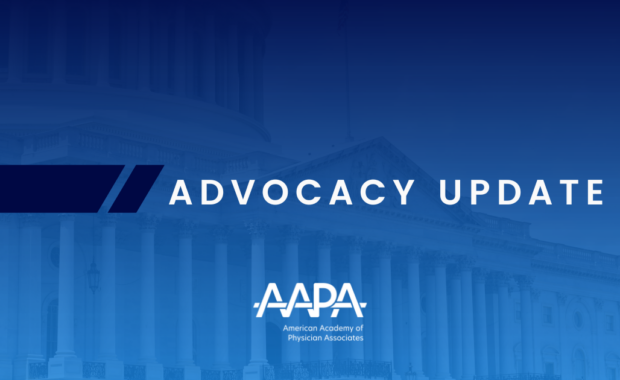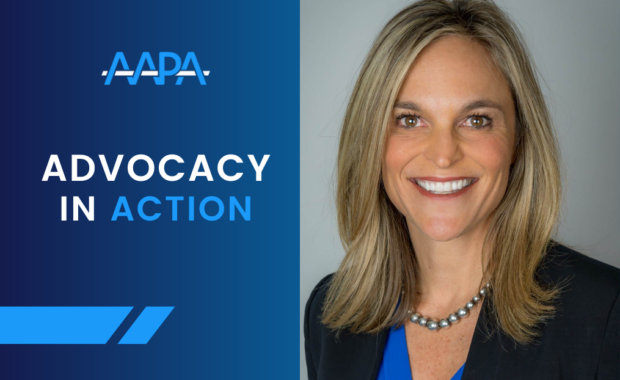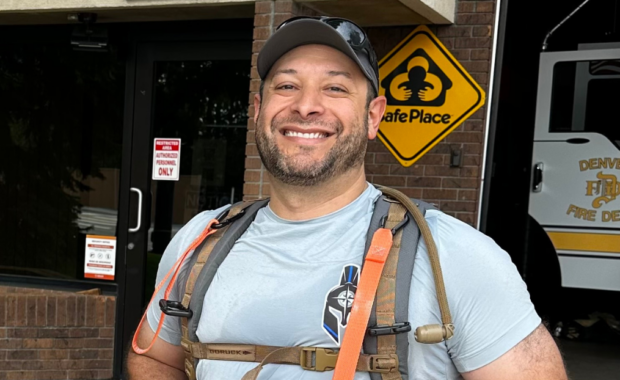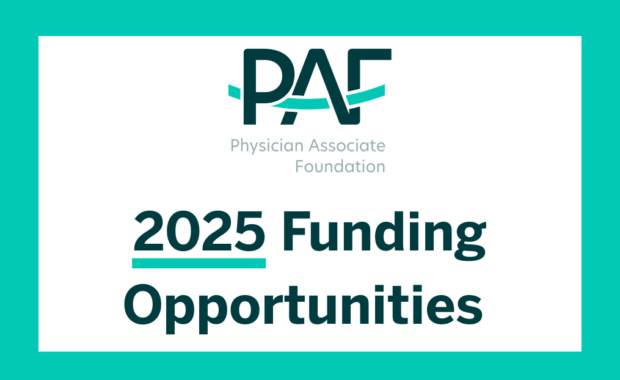Obesity Medicine PA Karli Burridge Finds Success with a New Approach
Gaining Health founder sets out to make a broader impact on obesity medicine
March 15, 2024
By Dave Andrews
Obesity and pre-obesity affect an estimated two out of every three patients treated by PAs. And roughly 300,000 Americans die each year from obesity-related diseases. As the number of Americans diagnosed with obesity continues to reach new highs, providers are increasingly looking for new strategies to better manage the disease and PAs are emerging as a powerful solution, leading the charge to provide comprehensive care and change the trajectory of this epidemic.
[Sign up for the free CME series, Addressing Obesity: A Community of Practice Series, today!]
Finding solutions for that segment of the patient population is what led Karli Burridge, PA-C, to shift her career focus away from primary care and toward the field of obesity medicine.
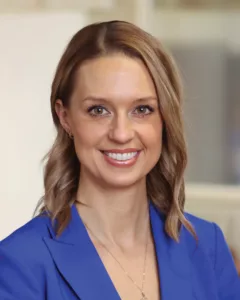
Burridge’s journey into the world of obesity medicine began while working at a general and bariatric surgery practice in Texas. She continually saw how frustrating it was for her patients to lose weight and keep it off through traditional behavior and lifestyle changes alone, no matter how hard they tried. So, she became determined to develop a more holistic obesity management program that addressed the root causes of obesity rather than just treating its complications.
“As a provider, I felt like I should be able to do more for my patients,” said Burridge. “I knew there had to be more than two methods to treating obesity beyond just lifestyle changes or bariatric surgery; it seemed like the gap was just too big.”
By collaborating with an obesity specialist and eventually spearheading an obesity program at a family practice, she gained invaluable insights into the complexities of this disease. Burridge’s dedication paid off when a large hospital system recognized the potential of her approach and invited her to implement a medical obesity program alongside their existing surgical one. This integration of medical, surgical, and lifestyle components under one roof proved highly successful, prompting the program’s rapid expansion. Within its first year the program was so popular that they had to relocate to a larger office space.
Addressing the Root Cause
Burridge says the difference is in the approach. Rather than focusing on treating the complications of obesity—conditions such as hypertension, diabetes, arthritis or any of the hundreds of complications that can arise from obesity—her programs zero in on addressing obesity itself.
“Yes, we still need to treat those complications, but if we can focus on the root causes, most of those other conditions we’re trying to manage will improve,” Burridge said. “So instead of ‘playing whack-a-mole’ and trying to treat one complication after another, we identify and treat the root cause.”
Over the years, Burridge has helped dozens of successful programs get off the ground in clinics and health systems across the country. And the feedback she has received is overwhelmingly positive.
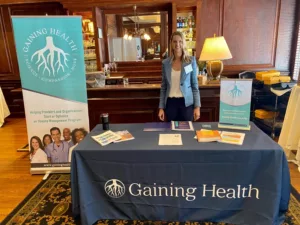
“One provider told me the ‘happy tears’ of the patients in her program are a common occurrence because [the patients] are so grateful that someone is truly listening to them, not blaming or shaming them about their weight, and instead is giving them hope through evidence-based care,” she said.
In 2020, Burridge founded Gaining Health, a consulting company focused on obesity management for healthcare providers, aiming to make an even broader impact in the fight against obesity. Gaining Health offers clinicians the tools and resources needed to start their own obesity treatment programs efficiently. From roadmaps to patient education materials and templates, the company streamlines the process, making it easier for providers to address this critical health issue.
“We’ve seen how the right obesity treatment program can significantly change each patient’s life, but there aren’t many providers who have experience starting a program,” Burridge said. The opportunity to develop resources for clinicians who want to get their program off the ground is what inspired her to create Gaining Health. “We make it so [the provider] doesn’t have to recreate the wheel.”
Expanding Educational Opportunities
Although obesity management is not commonly offered in primary care settings, Burridge hopes that will soon change as education and training opportunities expand. While there currently is no board certification in obesity medicine available for PAs and nurse practitioners, the number of certificate programs and fellowships is gradually on the rise.
“Considering the number of people who are living with obesity, we can’t rely on specialists alone to treat them,” she said.
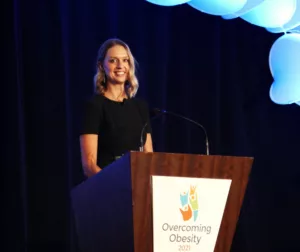
For that reason, Burridge is continually coordinating and participating in various presentations to help educate other providers on the growing demands within the field of obesity medicine. For many of her events, she has collaborated with some of the nation’s leading physicians in obesity medicine, like Dr. Scott Butsch, director of obesity medicine in the Bariatric and Metabolic Institute at the Cleveland Clinic.
Dr. Butsch shares the same passion as Burridge for expanding obesity care and he recently created one of the nation’s first obesity medicine fellowships for PAs and NPs at the Cleveland Clinic. Dr. Butsch says dedicating a year to focus on learning about the field of obesity medicine is especially critical for PAs. Recognizing the pivotal role PAs play in the healthcare workforce, he emphasizes the importance of providing them with specialized training to meet the growing demand in this field.
“The PAs I’ve worked with throughout my career have all been highly knowledgeable in providing excellent care, and having that extra level of training is obviously going to be a tremendous benefit to them in this growing field.”
Moreover, Butsch says the increasing amount of formal training opportunities in obesity medicine gives further credence to the complexity of the disease.
“Unfortunately, many people still believe obesity is a behavioral problem, when in fact, we know it’s a disease with a very strong biological basis,” Dr. Butsch said. “There are now many different treatment options available because there are so many different forms of this disease. It’s not a one-size-fits-all approach.”
Shedding Light through Education and Awareness
Burridge’s passion for raising awareness about obesity treatment extends to hosting The Gaining Health Podcast. Through the podcast, she keeps providers up-to-date with the latest research, best practices, and insightful interviews with leading experts in obesity medicine. By shedding light on the rapid advancements in this specialty, Burridge strives to equip clinicians with the knowledge and tools to make a meaningful impact on their patients’ lives.
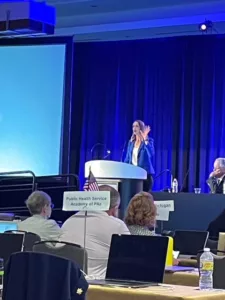
“There’s so much happening in this specialty, it can be hard to stay on top of all of it,” Burridge said. “So, I think [the podcast is] an easy way for clinicians to listen in, get an overview of a recent study or new guidelines that are coming out, and also to hear different perspectives from leading clinicians.”
Burridge says at the start of her career, she didn’t even know the term “obesity medicine.” But now, it’s become her passion as she helps both patients and providers realize its true value.
“Many people might have the impression that obesity medicine can be overwhelmingly frustrating, but in my experience, it’s actually ‘happy medicine,’” she said. “The impact that you can have on your patients’ lives and their overall health is so incredibly rewarding.”
As the obesity epidemic continues to grip patients across the country and the globe, the field of obesity medicine stands at the forefront of a transformative journey. PAs, like Karli Burridge, are emerging as pivotal players, equipped to address the root causes of obesity and provide comprehensive care to those affected. With dedicated efforts, expanded educational opportunities, and the power of awareness, we can collectively tackle this global challenge and usher in a healthier and happier future for all patients.
Dave Andrews is a freelance writer and public relations professional based in Northern Virginia. Contact him at [email protected].
Editor’s Note: This article was originally published in August 2023.
You May Also Like
AAPA’s National Health Priority Toolkit: Obesity
Obesity Management in Primary Care Training and Certificate Program
Addressing Obesity: A Community of Practice Series
Creating a Safe Space to Discuss Obesity with Patients, Experts Speak
Thank you for reading AAPA’s News Central
You have 2 articles left this month. Create a free account to read more stories, or become a member for more access to exclusive benefits! Already have an account? Log in.
